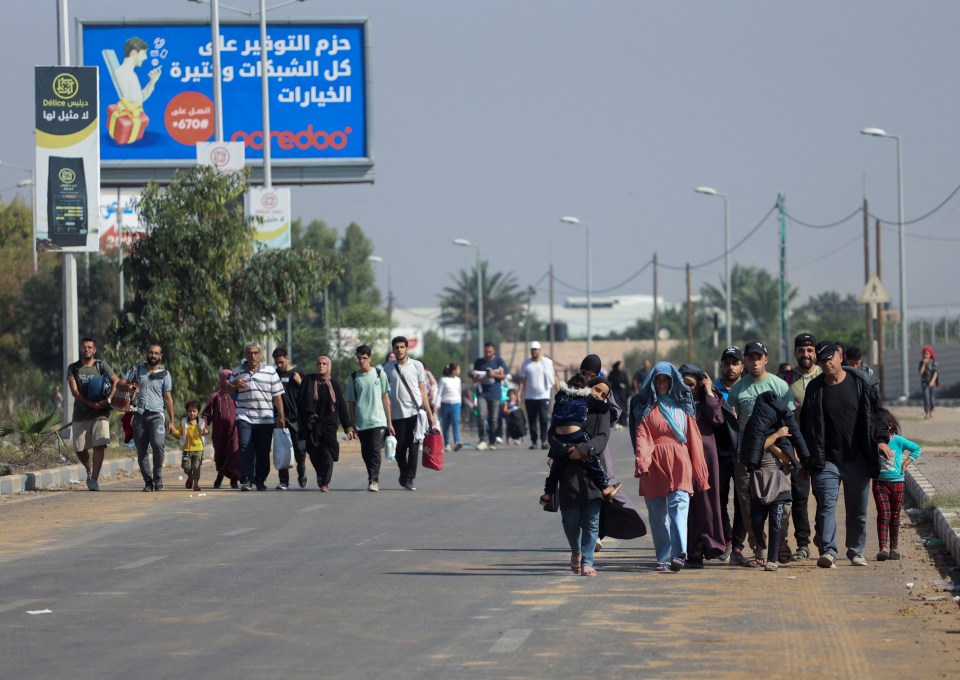AT least 100 British nationals have now fled Gaza, Rishi Sunak has confirmed.
The update comes as dozens are still feared to be trapped in the warzone as Israel enters its 32nd day at war with Hamas.
ReutersAt least 100 Brits have fled Gaza, PM Rishi Sunak confirmed[/caption]
AFPThe Prime Minister confirmed the news when speaking in Parliament after the King’s Speech[/caption]
AFPThe first Brits managed to cross the border from Gaza last week[/caption]
Speaking in Parliament after the King’s Speech, the PM said: “Well over 100 British nationals have been able to leave Gaza.”
Some 200 Brits were stranded in Gaza after Israel and Egypt sealed the strip’s borders and five are held there by Hamas terrorists.
Last week, the first Brits managed to cross the border from Gaza to Egypt – while others were turned away.
The Foreign Office confirmed that British nationals used the Rafah border crossing on November 1st but did not say how many.
“We will continue working with partners to ensure the crossing is opened again allowing vital aid into Gaza and more British nationals to leave safely,” a statement read.
“The crossing will be open for controlled and time-limited periods to allow specific groups of foreign nationals and the seriously wounded to leave”.
Hundreds of desperate foreign nationals managed to pour into Egypt across the southern checkpoint.
The Rafah crossing, the only route out of Gaza not controlled by Israel, was opened in a crucial move to allow 500 trapped foreigners to escape the hellish battleground.
SAS troops have been in Cyprus on standby for hostage rescue missions in Gaza.
The elite soldiers are also braced to free UK citizens trapped by the bloodbath.
Britain’s military bases in Cyprus offer a strategic presence in the eastern Med.
And the SAS sabre squadron has been joined on the island by a 100-strong crisis command team.
Their primary focus is the Gaza Strip but officials fear the war could spread, trapping more Brits in Egypt’s Sinai peninsular and Lebanon.
The SAS in Cyprus have the Special Forces Support Group with them and a fleet of their modified helicopters.
A similar joint force scrambled to Cyprus ahead of the Khartoum Airlift that rescued some 2,000 from war-torn Sudan in spring.
A source told The Sun: “The UK has permanent bases in Cyprus.
“You would expect us to make use of them when there is a crisis in the region like this.”
Rishi Sunak previously said around 200 British citizens trapped in Gaza had contacted the Foreign Office in an urgent plea for help.
On Tuesday, the PM called on pro-Palestinian groups to call off a march against the Israel-Hamas war scheduled to take place in London on Armistice Day.
The organisers of the rally have so far defied pleas from the British capital’s Metropolitan police force to postpone the demonstration planned for this Saturday.
Tens of thousands of people are expected to take to the streets to demand an immediate ceasefire in the conflict between Israel and Hamas.
“We continue to believe that planning protests on Armistice Day is provocative and disrespectful, and we urge organisers to reconsider,” Sunak’s spokesman told reporters.
He added that the government would “carefully consider any application” from the police to stop the protest from going ahead.
A number of senior members of Sunak’s ruling Conservative party have expressed anger at plans for protests on November 11, commemorating the end of fighting in World War I, and the sacrifice of armed forces personnel in all conflicts since 1914.
Sunak’s hardline interior minister Suella Braverman has even branded the protests “hate marches”.
Protest groups have not indicated they plan to march on Remembrance Sunday, when solemn ceremonies and two minutes’ silence are held at war memorials up and down the country.
But some fear their Saturday protest will disrupt Sunday’s commemorations.
Organisers have vowed to avoid the Whitehall area of central London where the Cenotaph — the focal point of Remembrance Sunday — is located.
London has seen large demonstrations on four successive weekends since Hamas gunmen on October 7 killed 1,400 people, mostly civilians, and took 240 hostages, according to Israeli officials.
Since then, Israel has relentlessly bombarded the Palestinian territory and sent in ground troops, with the health ministry in Hamas-run Gaza saying more than 10,300 people have been killed.
The Met has made dozens of arrests at the London protests, including for hate crimes.
It warned this week: “The risk of violence and disorder linked to breakaway groups (at these protests) is growing.”
ReutersWhile many managed to cross to the other side, others were turned away[/caption]

